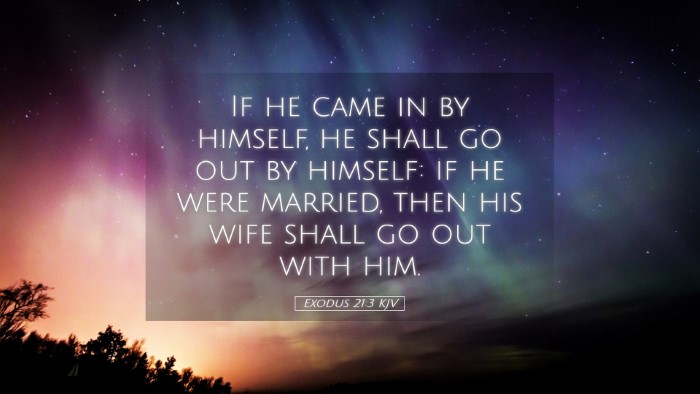Commentary on Exodus 21:3
Verse: Exodus 21:3 - "If he comes in by himself, he shall go out by himself: if he was married, then his wife shall go out with him."
Introduction
This verse falls within a section of Exodus often referred to as the "Covenant Code," which provides laws meant to govern the community of Israel after their deliverance from Egypt. The laws concerning servitude in this context reflect a blend of social justice and mercy, aiming to create a fair society under God's covenant. Here, we will explore the layered meanings, social implications, and theological significance of this specific verse, integrating insights from historical commentaries.
Legal Context and Interpretative Insights
Exodus 21 outlines regulations regarding servitude and debt. The mention of whether a servant comes in single or accompanied by a spouse speaks to the rights and conditions of servitude rather than merely the economic transactions of the time.
Commentary Insights
-
Matthew Henry:
Matthew Henry emphasizes the compassionate aspect of this law. He articulates that the law recognizes the personal circumstances of the servant, highlighting the importance of the family unit. If a man entered servitude alone, he would leave alone, but if he had acquired a family while serving, he would not be deprived of his family upon release. This notion underlines God's intent to maintain familial integrity and justice within societal frameworks.
-
Albert Barnes:
Albert Barnes explores the idea of property and relationship within the Hebrew laws of servitude. He conveys that the stipulation reflects the principle that a servant should not lose his family due to a contractual obligation. Barnes also highlights that this provision points towards the larger biblical theme of redemption and the restoration of relationships, a concept integral to both the Old and New Testaments.
-
Adam Clarke:
Adam Clarke delves into the practical implications of this law. He notes that it offered protections to those who found themselves in servitude, particularly emphasizing that anyone freed from service under certain conditions should not have familial separations forced upon them. Clarke regards the aspect of shared ownership over family as an important moral principle that transcends mere economic status.
Theological Reflections
The servant laws in Exodus 21 serve as a prototype for understanding God’s justice and mercy. The intended protection of family structures reflects God's overarching concern for human relationships and social harmony.
Implications for Community Life
This verse, when viewed in the light of the entirety of Exodus 21, illustrates a community where the rights of individuals and families matter profoundly. It disrupts the idea that financial transactions alone govern human relationships, signaling a deeper moral obligation towards one another. Such insights are critical for modern church leaders and theologians, who must grapple with issues of justice and family dynamics in their ministry.
Jesus and the Continuity of Themes
Reflection on this verse can be enriched by considering how Jesus expanded on themes of love, justice, and family. In the New Testament, He emphasizes the importance of relationships and the need for mercy over sacrifice. Here, we see continuity in God’s character from the Old to the New Testament. The treatment of families and individuals is further highlighted in Jesus’ teachings, advocating love and provision for all.
Practical Application for Today
For contemporary pastors and students of Scripture, Exodus 21:3 can provoke critical thinking regarding issues of servitude, equity, and community dynamics today. It compels congregations to reflect on how they treat individuals who are marginalized, especially those who struggle under economic systems that may place them in servitude-like conditions. The essence of the scripture challenges us to advocate for justice and the well-being of families within our communities.
Concluding Thoughts
Exodus 21:3, through its legal and moral framework, invites deeper reflection on God’s intentions for community, justice, and family. Historical commentaries enrich our understanding and challenge us to apply these principles thoughtfully within our current contexts. As pastors and theologians engage with this text, may they find guidance for fostering environments where justice and familial harmony thrive.


